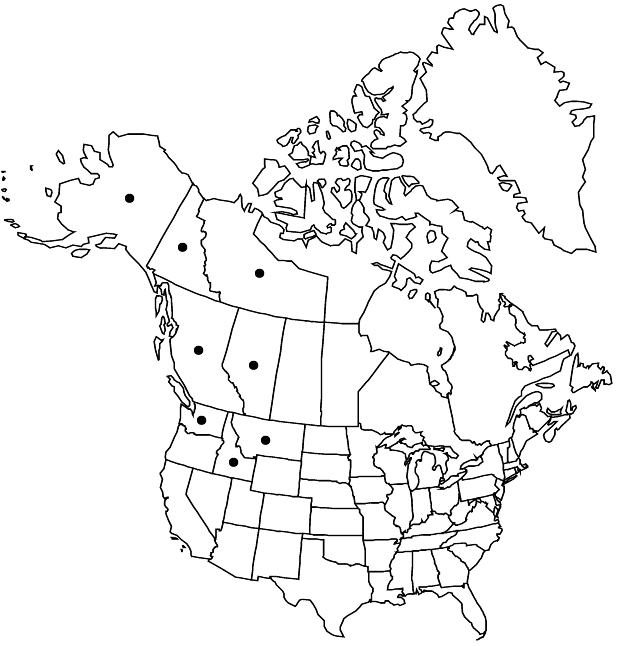Difference between revisions of "Micranthes lyallii"
in N. L. Britton et al., N. Amer. Fl. 22: 143. 1905 ,.
FNA>Volume Importer |
FNA>Volume Importer |
||
| Line 10: | Line 10: | ||
|name=Saxifraga lyallii | |name=Saxifraga lyallii | ||
|authority=Engler | |authority=Engler | ||
| + | |rank=species | ||
|publication_title=Verh. K. K. Zool.-Bot. Ges. Wien | |publication_title=Verh. K. K. Zool.-Bot. Ges. Wien | ||
|publication_place=19: 542. 1869 (as lyalli) | |publication_place=19: 542. 1869 (as lyalli) | ||
| Line 16: | Line 17: | ||
|name=Saxifraga lyallii subsp. hultenii | |name=Saxifraga lyallii subsp. hultenii | ||
|authority=(Calder & Savile) Calder & Savile | |authority=(Calder & Savile) Calder & Savile | ||
| + | |rank=subspecies | ||
}} {{Treatment/ID/Synonym | }} {{Treatment/ID/Synonym | ||
|name=Saxifraga lyallii var. hultenii | |name=Saxifraga lyallii var. hultenii | ||
|authority=Calder & Savile | |authority=Calder & Savile | ||
| + | |rank=variety | ||
}} | }} | ||
|hierarchy=Saxifragaceae;Micranthes;Micranthes lyallii | |hierarchy=Saxifragaceae;Micranthes;Micranthes lyallii | ||
| Line 43: | Line 46: | ||
-->{{#Taxon: | -->{{#Taxon: | ||
name=Micranthes lyallii | name=Micranthes lyallii | ||
| − | |||
|authority=(Engler) Small in N. L. Britton et al. | |authority=(Engler) Small in N. L. Britton et al. | ||
|rank=species | |rank=species | ||
| Line 58: | Line 60: | ||
|publication year= | |publication year= | ||
|special status= | |special status= | ||
| − | |source xml=https://jpend@bitbucket.org/aafc-mbb/fna-data-curation.git/src/ | + | |source xml=https://jpend@bitbucket.org/aafc-mbb/fna-data-curation.git/src/f50eec43f223ca0e34566be0b046453a0960e173/coarse_grained_fna_xml/V8/V8_97.xml |
|genus=Micranthes | |genus=Micranthes | ||
|species=Micranthes lyallii | |species=Micranthes lyallii | ||
Revision as of 22:33, 16 December 2019
Plants solitary or sometimes mat-forming, rhizomatous. Leaves basal; petiole rounded to flattened, 2–10 cm; blade spatulate to obovate, 0.8–8 cm, thin, base cuneate to slightly attenuate, margins serrate to dentate, eciliate or sparsely glandular-ciliate, surfaces abaxially glabrous, adaxially sparsely brown-hairy. Inflorescences usually 10–15-flowered, lax, cylindric thyrses, (red), (4–)7–30 cm, sparsely purple-tipped stipitate-glandular. Flowers: sepals reflexed, oblong to elliptic; petals white, each with 2 basal yellowish green spots, elliptic to round, clawed, 2–5.5 mm, longer than sepals; filaments club-shaped, (to 6 mm); pistils connate 1/2+ their lengths; ovary superior, (to 1/3 adnate to hypanthium). Capsules green to yellow, distal 1/2 purple, ± folliclelike, (basally connate). 2n = ca. 56, 58.
Phenology: Flowering summer–early autumn.
Habitat: Wet, rocky meadows, mountain to alpine streamsides
Elevation: 800-4000 m
Distribution

Alta., B.C., N.W.T., Yukon, Alaska, Idaho, Mont., Wash.
Discussion
Although they have nearly disjunct sets of populations, the subspecies of Micranthes lyallii are difficult to distinguish from each other. The more northern plants tend to be larger with wider leaves and often have been called Saxifraga lyallii subsp. or var. hultenii. Apparent hybrids with M. odontoloma occur in Alberta, British Columbia, and northern Idaho, and near Glacier National Park, Montana.
Selected References
None.